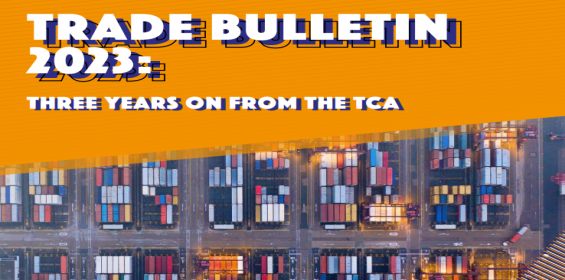TCA still presenting challenges to manufacturers three years on
Published: 06 December, 2023
According to Make UK research Britain’s manufacturers are calling on the Government to continue working closely with the EU to make exporting easier and improve Britain’s Trade and Cooperation Agreement (TCA) with the EU so companies both sides of the Channel can prosper and grow their businesses through the delivery of more frictionless trade.
When the new post-Brexit trading arrangements came into force three years ago, 96% of UK manufacturers said the new rules were badly disrupting trade with the EU. The latest trade bulletin published recently shows that some 90% of UK companies still find trading with the EU a challenge. Customs paperwork and border delays prove the biggest barrier for 64% of companies, with logistics an issue for over half of exporters (52%). Demonstrating Rules of Origin of goods is still difficult for 36% of businesses as they struggle to ensure their goods meet the tariff-free rules of entry to the EU, by showing they contain sufficient product of UK origin.
However in spite of any difficulties, nearly three in four companies (74%) are still exporting to the EU, with Britain’s manufacturing sector exporting £230 billion worth of goods to the EU last year, up 26% from 2021. Overall, however, the effect of the new arrangements on businesses is varied with just one in three seeing export volumes increasing moderately or significantly over the last two years. But two in five (40%) say they have experienced a moderate or significant decline in export volumes.
While the EU is still the UK’s largest export market, the US remains a critical market and is a significant second destination for manufacturers with nearly half (48%) exporting there. The other top five non-EU destinations for exports are Northern Ireland, Asia & Pacific and Canada. These results, especially for small and medium-sized businesses, indicate that companies may well be using the new skills they have learned navigating the new complex customs rules for EU trade to expand into wider global markets.
With a critical labour shortage in the UK’s manufacturing sector, accessing skilled EU workers remains a key challenge. The new data shows that recruiting from the EU has become harder for 44% of companies in the last three years, and changes to the UK’s Shortage Occupation List of necessary skilled workers has been slow to recognise the record labour shortages across the sector. Manufacturers want to see cooperation with the EU on business mobility to and from Europe – particularly around the arrangements for short-term working visas and where professional and technical qualifications can be recognised both in the UK and EU.
Earlier this year the UK and EU negotiating teams worked together to successfully draw up the Windsor Framework which restored the smooth flow of goods crossing the Irish Sea from Great Britain to Northern Ireland. . Manufacturers are now calling on Government to continue in this spirit of cooperation to look at how the TCA is working in practice and how it can be improved.
Nearly four in five (77%) of companies believe the UK and EU must collaborate to improve export procedures, customs administration and goods clearance and EU and UK levels. A simplified Trusted Trader scheme is needed which can be applied across all EU member states. Greater cooperation on regulation is also required with a call for the indefinite extension of CE marking recognition for all UK manufactured goods and internally HMRC must separate Customs from the rest of the department to give customs agents direct access to a dedicated team. Ultimately, mutual recognition of UK Advanced Tariff, Origin and Valuation rulings by the UK or UK rulings (and vice versa) would dramatically support trade.
Stephen Phipson, CEO Make UK, the manufacturers’ organisation said: “It is clear that manufacturers across the UK have performed strongly on the international stage in the last year with conditions remaining challenging. Since Britain left the EU, companies have had to deal with the new trade arrangements of the TCA merging with global disruption brought about by the Covid pandemic. Yet Britain’s manufacturers have powered through to build international trade in new markets while navigating through the minefield of challenges which still remain in trading with our closest partner, the EU.
“Government must jump on this potential and look to manufacturers as they continue to explore new markets further afield as well as closer to home. Reinstating the Trade Access Programme would help companies identify opportunities overseas and to move into new markets while providing in-market support would ensure companies get the correct advice in a time critical manner to help them compete successfully on the global stage.
“What is fundamentally missing and needed is an Exports Council to deliver joined-up policy to support trade which should be incorporated into the body delivering an overarching Industrial Strategy here in the UK.”
https://www.linkedin.com/company/makeuk/







